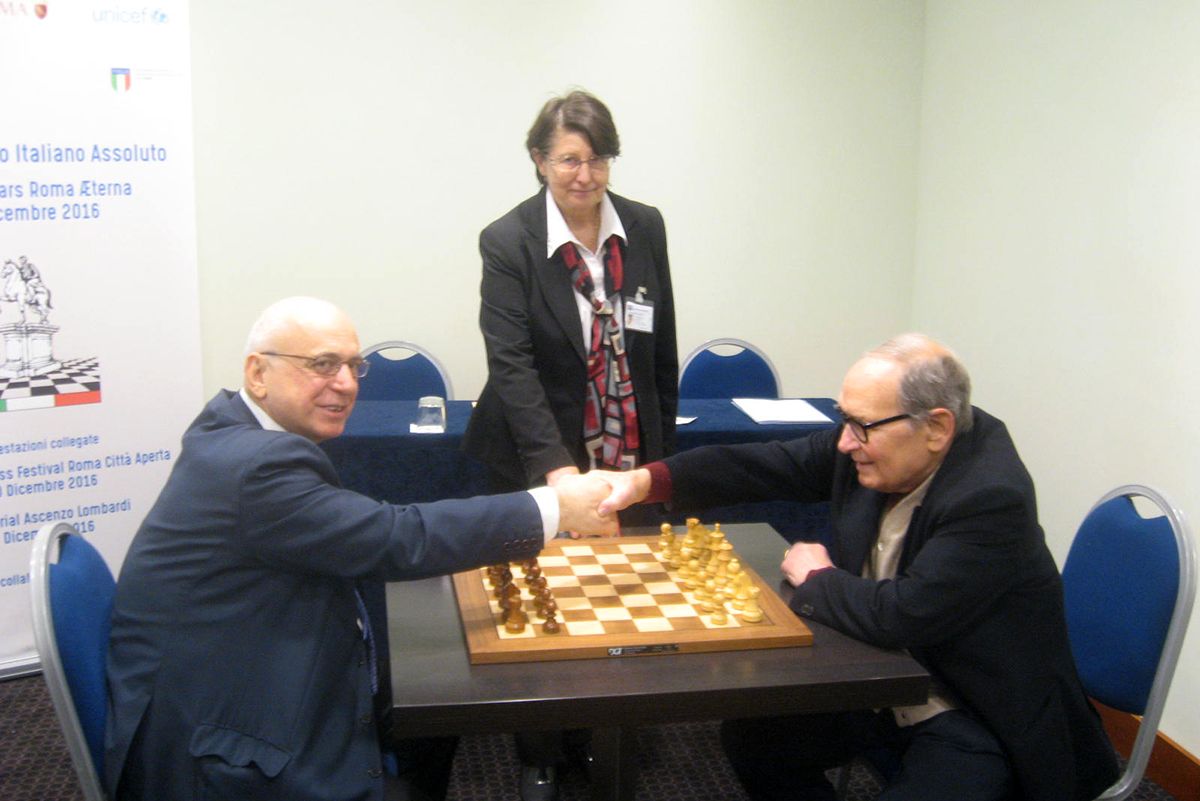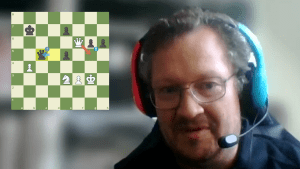
Ennio Morricone (1928-2020), Avid Chess Fan
Ennio Morricone, who passed away on Monday at the age of 91, was world-famous for his film scores. His career spanned over six decades as a composer, orchestrator, conductor, and trumpet player. On top of all that, he was an avid chess fan as well.
Morricone's greatness was brought forward again by the sheer amount of obituaries and eulogies that appeared on Monday in mainstream media. He was one of the absolute giants of 20th-century cinema as the composer of famous film scores from Sergio Leone's The Good, The Bad, and The Ugly to Brian DePalma's The Untouchables to Quentin Tarantino's The Hateful Eight.
Morricone loved chess. He learned the game when he was 11 and before his musical career took off, he played in club tournaments in Rome in the mid-1950s. His first official tournament was in 1964, where he won a prize in the third category for amateurs. He was even coached by 12-time Italian champion IM Stefano Tatai for a while. Soon he got too busy for chess, but he would always keep a keen interest in the game.

It is not clear how strong Morricone was as a player. His Elo rating was estimated to be 1700. He did hold GM Boris Spassky to a draw once in a simul. It took place in 2000 in Turin with 27 players and included Morricone's son Andrea and Paolo Fresco, CEO of Fiat at the time. Morricone was the last player standing in that simul, and Spassky had to concede the half point.
Over the years, Morricone played chess with many big names of our sport, including GMs Garry Kasparov, Anatoly Karpov, Judit Polgar, and Peter Leko. He would get in touch with them when he was in the same city for a concert, but often it was the chess player who contacted him first.
I always admired Ennio Morricone’s work and passion. I was fortunate to meet him, he challenged me in 2 rapid games in 2004 at the Hungarian Academy of Rome. I will always remember him and continue listening to his compositions as his artwork and compositions were one of kind. pic.twitter.com/pjAbrQsZ5l
— Judit Polgar (@GMJuditPolgar) July 6, 2020
When a chess tournament was underway and he was available, Morricone would often drop by and observe. For instance, he attended the closing ceremony of a tournament in 2016 in Rome and played a game with the president of the Italian Chess Federation there. That was also the last time he was seen at a chess event.

In March last year, the very interesting article "Ennio Morricone Plays Chess" was published as a blog on the website of The Paris Review. It is taken from the book From Ennio Morricone: In His Own Words, which describes the years-long conversations between Morricone and De Rosa about music and life and discusses the interaction between the two. Morricone called it the best book ever written about him.
Here's a lengthy quote by Morricone from it, about how he looks at the links between music and chess.
In time, I’ve discovered that strong links exist between chess and the musical notation system, set up as it is in durations and pitches. In chess, the two dimensions remain spatial, and time is what players have at their disposal in order to make the right move. In addition there are horizontal and vertical combinations, different graphic patterns, just like musical notes in harmony. Even still, one can pair patterns and plays as if they were instrumental parts in an orchestra. The player who doesn’t start—who has been assigned black chess pieces—has ten moves to choose from, before it is again the opponent’s turn—white chess pieces. The number of possible moves then grows exponentially with the following plays. This makes me think about counterpoint. There are analogies between the two disciplines—if one is interested in looking for them—and progress in one field oftentimes is linked to progress in the other. It is not by chance that mathematicians and musicians are generally among the best chess players. Take Mark Taimanov—an exceptional pianist and chess player—Jean-Philippe Rameau, Sergei Prokofiev, John Cage, my friends Aldo Clementi and Egisto Macchi. Chess is related to mathematics and mathematics is related to music, as Pythagoras claimed. And this is all the more true for the kind of music Clementi composed, a music substantively based on tone rows, numbers, and combinations … the same key elements as in chess.
In the same article, Morricone talked about GM Mikhail Tal and noted that GM Bobby Fischer was perhaps his favorite player.
Morricone's love for the game can also be seen from different examples of chess-related compositions he made throughout the years. One of these is "Chess Game" (Spotify link), which is on the soundtrack of The Endless Game (Gioco senza fine), the TV miniseries from the late 1980s. Another is "Dance of the Chess Game" (Spotify link), which is also part of a TV miniseries from the same period, Secret of the Sahara (Il segreto del Sahara).
Morricone also composed the "Chess Players’ Anthem" (Inno degli scacchisti) for the 2006 Chess Olympiad in Turin.
Further chess connections were mentioned by John Henderson in his Celeb 64 column in New in Chess Magazine 2019/3: "When the classic BBC series 'The Master Game' went international, they used his score 'Come Maddalena' for the signature tune. And last year, when Garry Kasparov appeared on Desert Island Discs, one of his eight musical choices was Morricone's 'Chi Mai.'"
Our Italian readers will enjoy this video from 2004, filmed at Morricone's house, in which the maestro also talks about chess and music, and plays a game with GM Michele Godena.
In 2007, after Morricone had won the Academy Honorary Award, he was asked on Italian TV if he would have liked anything more than that prize. His answer: "To be a grandmaster, like Kasparov."
RIP Ennio Morricone. "If I were not a musician I would wish to be a chessplayer. But a great chessplayer, one of those about whom history is written; like Fischer, Karpov, Kasparov and many GMs of the past. It is just a dream; one that arrives, on time, when I lose a game." 1991 pic.twitter.com/W1dAOFniFq
— Ian Rogers (@GMIanRogers) July 6, 2020






